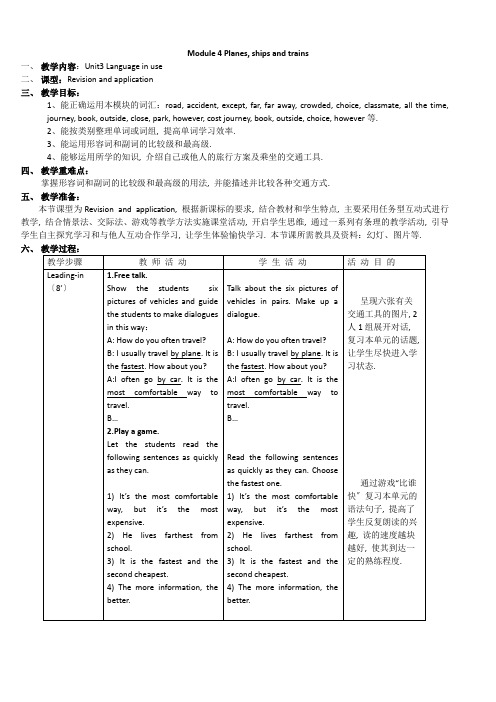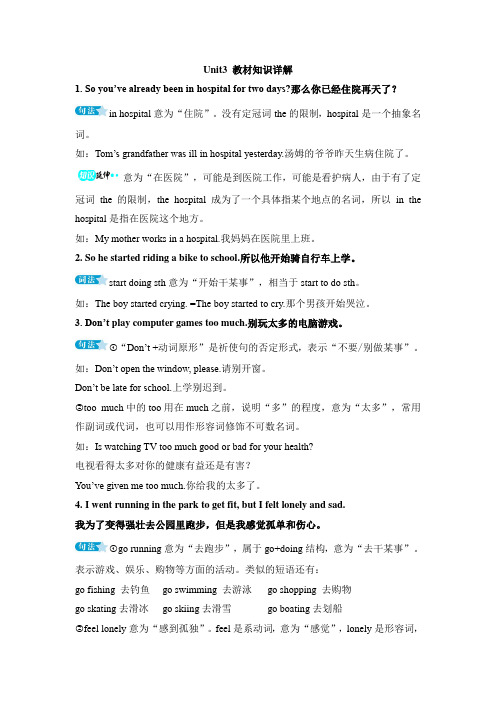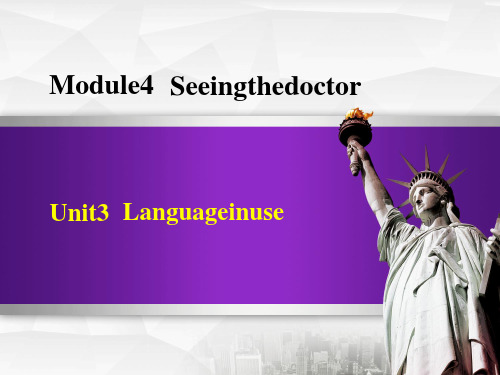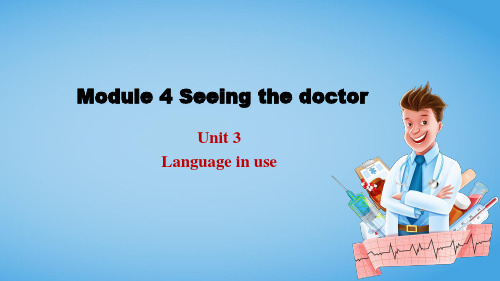外研版英语八年级下册:Module 4 Unit 3 Language in use. 教案设计及练
2022年外研版八年级上册《Module 4 Unit 3》公开课教案

Module 4 Planes, ships and trains一、教学内容:Unit3 Language in use二、课型:Revision and application三、教学目标:1、能正确运用本模块的词汇:road, accident, except, far, far away, crowded, choice, classmate, all the time,journey, book, outside, close, park, however, cost journey, book, outside, choice, however等.2、能按类别整理单词或词组, 提高单词学习效率.3、能运用形容词和副词的比较级和最高级.4、能够运用所学的知识, 介绍自己或他人的旅行方案及乘坐的交通工具.四、教学重难点:掌握形容词和副词的比较级和最高级的用法, 并能描述并比较各种交通方式.五、教学准备:本节课型为Revision and application, 根据新课标的要求, 结合教材和学生特点, 主要采用任务型互动式进行教学, 结合情景法、交际法、游戏等教学方法实施课堂活动, 开启学生思维, 通过一系列有条理的教学活动, 引导学生自主探究学习和与他人互动合作学习, 让学生体验愉快学习. 本节课所需教具及资料:幻灯、图片等.六、教学过程:一、用所给单词的适当形式填空1 .Tony lives ___________ ( far) from the school in his class.2. Betty’ s dad has _____________(expensive)journey .3. Daming has ___________(dangerous) journey .4. Lingling’s home is ________( cl ose) to school.5 .Daming has _________(fast) journey by bicycle.二、根据句意及首字母提示补全单词1、Jenny sometimes t the train to Beijing.2、Tony lives f from the school, so he has the longest journey.3、There are many people in the zoo, it’s very c .4、Lucy’s home is the c to the school, so she walks.5. Boeing 747 is one of the most expensive ____________(飞机) in the world.三阅读理解Modern life is impossible without traveling. The fastest way of traveling is by plane. With a modern airliner(客机), you can travel in one day to places which needed a month or more to get to hundreds of years ago.Traveling by train is slower than by plane, but you can see the places you are traveling through. Modern trains have comfortable seats and dining-cars. They even make the longest journey enjoyable(令人愉快的).Some people prefer to travel by sea. You can visit many other countries or different parts of your country. Ships are not so fast as trains or planes, but traveling by sea is a very pleasant way to spend a holiday.Many people like to travel by car. You can make your own timetable. You can travel three or four hundred miles or only fifty or one hundred miles a day, just as you like. You can stop if there is something interesting, for exampl e, at a good restaurant where you can enjoy a good meal, or at a hotel to spend the night. That’s why traveling by car is popular for pleasure trips, while people usually take a train or a plane when they travel on business.( )31. From the passage, we know the fastest way of traveling is ____.A. by trainB. by seaC. by planeD. by car( )32. If we travel by car, we can ____.A. make the longest journey enjoyableB. travel to a very far place in a few minutesC. make our own timetableD. visit many other countries( )33. The underlined word “They〞in the passage refers to(指的是) ____.A. modern trains in the countryB. the comfortable seats and dining-carsC. the travelers on the modern trainsD. the slower ways of traveling( )34. When people travel on business, they usually take ____.A. a plane or a carB. a car or a boatC. a boat or a trainD. a train or a plane( )35. How many ways of traveling are mentioned in the passage?A. Four.B. Three.C. Two.D. Six.Unit 1 While the lights were changing to red,a car suddenly appeared.教学目标【知识目标】1、能掌握本单元的单词和短语:bite, climb, hide, throw, fridge, pain, worse, medicine.2. 掌握本单元中的常用句型.【能力目标】1、能根据图片预测下文;能理解作者通过故事要传达的信息;能够理解语篇中故事发生的顺序.2、能够仿照范文, 用过去进行时对发生在周围的事故进行描述或报道.【情感态度目标】学习遇到突发事件时应沉着冷静, 尽量想方法自救的平安意识.教学重难点【教学重点】过去进行时, when和while引导的时间状语从句.【教学难点】能运用过去进行时就意外事故这一话题进行讨论.教学过程Ss look the pictures and fill in the blanks.Step 2 Consolidate new wordsLook and say. The teacher shows the pictures of new words and let the students to say the new words as quickly as possible.Step 3 Say the meaning of the phrases.Work in pairs. Let Ss say the meaning of the phrases as quickly as possible.Step 4 Look at the pictures and say what’s happeningLook at t he picture and use the words from the box to say what’s happening at that time.Step 5 Listen to Activity 2 and read1. The driver was/was not going fast.2. The driver was/was not looking.3. The driver was/was not talking on his mobile phone.Step 6 Listen to the dialogue and answer the questionsLet Ss listen to the dialogue and answer the two questions. Then check in groups.Step 7 Read the dialogue and answer the questions1. What was the boy doing when he was riding his bike?2. When did a car suddenly appear round the corner?3. Did the boy fall off his bike?Step 8 Read Activity 3 and complete the following advice.When you are riding a bike, think about the risk of an accident!Pay ___________ and stop at the___________.Don’t ______ too fast.Don’t ride ____________ with your friends.Don’t ______________!Step 9 Complete the passage with the correct form of the words from the box.Let Ss read the passage first and choose the words and expressions from the box.Step 10 Everyday EnglishAre you all right? That’s very dangerous!That’s too bad.Anything else?Step 11 Language pointsLet Ss master the main points of the passage.Step 12 Listen and mark when the speaker pauses1. Listen and mark when the speaker pauses.1) While the lights were changing to red, a car suddenly appeared round the corner.2) When I was waiting to cross the road, the accident happened.2. Now listen again and repeat.Step 13 Work in groups of fourStudent A: You’re a policeman at an accident scene in the street. Ask people questions.Student B, C and D: You saw the accident. Answer the policeman’s questionsStep 14 Grammer掌握过去进行时的用法.Step 15 Summary重点短语in time fall off pay attention side by side过去进行时Do some exercises about the main points.Step 17 中考链接Do the exercises in the entrance exam to senior high schools. 课堂作业编写一个对话,介绍你亲眼目睹的一次交通事故.教学反思。
外研版八年级下册英语精品教学课件 Module 4 Unit 3

Practice
Presentation
用how long对现在完成时的时间状语 提问。
How long have you played football? How long have you been like this? How long have you had the dog?
Presentation
表示某一行为或状态持续多长时间时,根 据时间的不同,可以使用不同的时态。
A. has left
B. has come to
C. has gone to D. has been away from
6. — Did you borrow the comic book from
the library?
— Yes. I_____ it for three days. I’ll
return it this afternoon.
______ in Sichuan for five years. A. was teaching B. has taught C. will teach D. taught
Practice
11. She _______ her hometown for many
years. No one nearly knows her.
A. borrowed
B. kept
C. have borrowed D. have kept
外研版英语八年级下册Module4 Unit3 教材知识详解

Unit3 教材知识详解1. So you’ve already been in hospital for two days?那么你已经住院再天了?in hospital意为“住院”。
没有定冠词the的限制,hospital是一个抽象名词。
如:Tom’s grandfather was ill in hospital yesterday.汤姆的爷爷昨天生病住院了。
意为“在医院”,可能是到医院工作,可能是看护病人,由于有了定冠词the的限制,the hospital成为了一个具体指某个地点的名词,所以in the hospital是指在医院这个地方。
如:My mother works in a hospital.我妈妈在医院里上班。
2. So he started riding a bike to school.所以他开始骑自行车上学。
start doing sth意为“开始干某事”,相当于start to do sth。
如:The boy started crying. =The boy started to cry.那个男孩开始哭泣。
3. Don’t play computer games too much.别玩太多的电脑游戏。
①“Don’t +动词原形”是祈使句的否定形式,表示“不要/别做某事”。
如:Don’t open the window, please.请别开窗。
Don’t be late for school.上学别迟到。
②too much中的too用在much之前,说明“多”的程度,意为“太多”,常用作副词或代词,也可以用作形容词修饰不可数名词。
如:Is watching TV too much good or bad for your health?电视看得太多对你的健康有益还是有害?You’ve given me too much.你给我的太多了。
4.I went running in the park to get fit, but I felt lonely and sad.我为了变得强壮去公园里跑步,但是我感觉孤单和伤心。
Module+4+Unit+3+language+in+use 外研版英语八年级上册

c) The most comfortable way is going by train, but it takes more time than going by plane.
3. The_c_h_e_a_p_e_st_(cheap)way to get there is by coach. 4. I am in a hurry. What is the___fa_s_t_e_st_(fast)way to get
there? 5. The fastest way to travel is by plane, but it is also
4.What are the popular places for sightseeing in London? London has the most popular places for sightseeing.
学习目标 新知学习 重点研讨 课堂小结 当堂检测
听力原文
London is the biggest city in Britain. It also has the largest population. After London, Birmingham is the second largest city, with around four million people living and working there. There are a lot of small cities such as Oxford and Cambridge. They are beautiful and they have two of the oldest universities in the world. Cambridge is the nearest to London. The most expensive city is London but it’s also the most interesting. London is on the River Thames, and has the most popular places for sightseeing, such as Big Ben, Buckingham Palace and Tower Bridge.
外研版八年级下册英语 Module 4 Unit 3 Language in use

Bill:Yes, alot. Iusuallyplaycomputergameslateatnight. Doc魔to法r:(3)_T__h_a_t'_s_it_.__________ Bill记:忆(4)___C_a_n_I_h_e_l_p_y_o_u_?__H_o_w__lo_n_ghaveyoubeenlikethis? Doctor:WelTl,hyaotu'ssipt.endtoWomhuacth'stiwmreoinngfrwointthomfthee?
Module4 Seeingthedoctor
Unit3 Languageinuse
同学们,上一课学习的单词、短语和句型你们都掌握了 吗?现在大家来检验一下,点击下面的音频开始听写吧!
Canyoumakeupsentenceswiththewords “since, for, sincethen”?
3
Completethesentences. 1—Ifellilltwodaysago. —Soyou've____b_e_e_n_illfortwodays? —That'sright. 2—Isawthedoctorthreedaysago. —Soyouhaven't___s_ee_n___herinthelastthreedays? 3—I'llwalktoschoolforthefirsttimetomorrow. —Soyou'venever__w__a_lk_e_d_toschoolbefore? 4—Icameintohospitaltwodaysago. —Soyou'vealready_____b__e_eninhospitalfortwodays? 5—Howlong____h__a_v_eyou______h_a_daheadache? —Oh, itbeganabouttwohoursago.
外研版八年级下Module 4 Unit 3教案

Module 4 Seeing the doctorUnit 3 Language in use教学目标【知识与技能】1. 能够正确使用下列单词和词组:cough, fever, headache, stomach, ache, stomach ache,toothache, ill, this, since, cold, catch a cold, take sb.’s temperature, fast food, health, take part in sth., well, heart, active, pet, member, , then, daily, weak, exercise。
2. 能正确使用现在完成时与for 和since 引导的时间状语连用的结构。
3. 能够与同学合作完成医患间的角色扮演和对话。
4. 能够针对不健康的生活习惯或行为给出适当的建议和看法。
【情感、态度与价值观】在教学过程中,学生们通过实践、参与互动,讨论活动,体验与他人合作,共同完成学习任务的乐趣。
教学重难点【教学重点】能正确使用现在完成时与for 和since 引导的时间状语连用的结构,以及读懂关于饮食和运动习惯的短文。
【教学难点】能够写关于运动习惯的短文。
(难点)教学准备本节课型为Revision and application,根据新课标的要求,结合教材和学生特点,主要采用任务型互动式进行教学,结合情景法、交际法、听说法、归纳法等教学方法实施课堂活动,开启学生思维,通过一系列有条理的教学活动,引导学生自主探究学习和与他人互动合作学习,让学生体验愉快学习。
本节课所需教具及资料:幻灯、图片、调查表等。
教学过程Step1. Warming upAsk students to think of three situations in their lives that started in the past and still continue. Tell them to write them down. For example:I live near my grandparents.I study at this school.I haven't seen my glasses.Read the sentences in the box as a class and ask students to tell you what "for" and "since" mean.Ask students to rewrite their three situations, using the present perfect and "for" or "since", so that they can tell people how long this situation has been happening. For example, I’ve lived near my grandparents since I was born./ I’ve studied at this school for many years./I haven't seen my glasses since the weekend.Monitor and help as necessary. Then ask three or four students to write some of their sentences on the board as examples.Step2. Pre-taskFor & SinceTell students to look at the sentences in the language box and tell you where '"for" and "since" go in a sentence.Draw students' attention to the feet that these words are frequently used with the present perfect. Point out that the difference between “for" and "since" is as follows:for + (length of time); for three weeks, for five minutes, for three centuriessince + (when the situation started); since winter, since my birthday, since this morningRead the questions to the students. Then ask them to listen and repeat. Help with pronunciation and intonation as appropriate.Step3. While-task1. Work in pairs. Ask and answer the questionsHave students read the questions and write their answers, using complete sentences. Monitor as necessary.Put students in pairs to take turns asking and answering the questions.Ask individual students to report to the class about their partner's answers.2. Complete the questionnaire about healthy living. Use since or for where necessary.Have students read the questions and think about their answers for a minute.Tell students to write their answers using "since" or "for" wherever appropriate.Have students compare answers with their desk partner and correct each other's spelling and grammar. Ask them to focus on the correct use of "since" and "for" in particular. 'Put students with a different partner to take turns asking and answering the questions.Ask students to report back to the class about their partner's answers to the questionnaire.3. Complete the sentences.Put students in pairs.Tell them to read the short dialogues and decide how many of them could be at the doctor's. Check ideas as a class.Ask pairs to complete the conversations with words in the correct form, using the time expressions to help. Tell them all the words are "have + participle" forms.Check answers as a class.1).been/felt 2). seen 3). walked 4). been 5). have; had4. Complete the passage with the words and expressions in the box.Play a vocabulary game (see "Methodology tip" below) to review the words and expressions in the box.After reviewing the words and expressions in the box, put students in pairs to complete the text. Check as a whole class.1) well2) coughs 3) exercise 4) last food 5 )weak 6) cold 7) stomach ache 5. Complete the conversation with the sentences in the box.Have students read the conversation and complete it with the sentences in the box. Tell them to refer to Darning's conversation with his doctor in Unit 1 if necessary.Have students compare answers with a partner. Check answers as a whole class.Work in pairs. Read out the conversationPut students in pairs to practice the conversation between Bill and his doctor. Set a time limit of five minutes.Ask volunteers to perform for the class.If you wish, ask students to role-play the conversation without referring too closely to the script, making any small changes they like.1). Can I help you?2). How long have you been like this?3). That’s that.4). What's wrong with me?6. Read the passage and match the problems with the advice.Tell students to cover the passage. Read the three pieces of advice given below the passage, either as a class or individually.Using the advice as clues, ask students to guess what the problems are. Write their ideas on the board.Play the recording for students to listen to and try to match the problems with the advice.Have students then read the three problems and check their answers.Allow them to compare answers with their partner before checking as a whole class.Ask students to read the problems and advice again and tell you if there are any new words. Check meanings using a dictionary or by looking at the context.Work in pairs. Do you have similar problems? Talk about your advice.Ask students to think of a problem they have (tell them they can make one up), with what they eat or with how much time they spend on the computer or on video games. Encourage them to use their imagination.Ask them to write down the problem and he lp with any words they may need.Put students in small groups to take turns explaining their problem and then asking for and giving advice.Ask a member of each group to report to the class about some of the problems and the advice they gave in their groups.Discuss the advice as a class.1) --- b; 2) --- a; 3) --- c7. Listen and complete the passage.Make sure the students read the passage carefully before listening so they know exactly what they will be listening for.As a class, discuss what kind of words students will need to use to complete each gap,Play the recording for students to listen to and complete the sentences. Play the recording twice if needed.Allow students to compare answers with their desk partner before playing the recording one more time.Check answers as a whole class.1). awful 2). very tired 3). three days 4). headache5). stomach ache 6). drink more water 7). three times 8). stay in bedStep4. Post-taskAround the worldRead the passage with the class. Ask them to find words with meanings related to health. Checkstudents know the meaning of these words.Discuss with the class how important they think the work of the WHO is. Find out if they think it would be good to work for the WHO or not.Ask students to close their books and, with their desk partner, try to remember as much as possible about the passage.Elicit as much information about the passage as possible from the class and write it on the board. Allow students to read the passage again to check if the class has forgotten any information. Module taskDoing a survey to find the most suitable exercise for you.8. Work in groups. Do a survey to find what exercise your group members do and the effects.Tell students they are going to do a survey. Ask them to read the questions and predict the most popular answer to each, writing their answers down on apiece of paperHave students keep their predicted answers secret and hand them to you.Ask students to make a table to write the results of their survey.Divide the class into four or five groups. Tell them to ask the questions within the group and note down the answers.When they have finished, form new groups of four or five by taking one student from each of the groups and putting them together. Tell them to exchange information to complete the class picture. Still working in their groups of four or five, students write a paragraph summarizing their class's answers to the questions. Collect the paragraphs and make an information poster. Ask a student to illustrate the poster with a graph.9. Decide what exercise Is the most suitable for you.Have students look at the different types of exercise their classmates named in the class survey. Tell them to choose the type of exercise they think is the most suitable for them and think of reasons.Tell student to write two or three sentences explaining their choice.10. Talk about you’re your decision and your decision and your reasons with the rest of the class. Ask individual students to read out their sentences.课堂作业Write a passage about doing sports.教学反思。
外研版英语七年级下册Module8Unit3《Languageinuse》说课稿

外研版英语七年级下册Module 8 Unit 3《Language in use》说课稿一. 教材分析外研版英语七年级下册Module 8 Unit 3《Language in use》的主题是关于日常生活中的交际用语。
通过本节课的学习,学生将掌握一些基本的交际用语,如问候、介绍、道别等,并能够运用所学知识进行简单的实际交流。
教材内容丰富,贴近学生的生活实际,有利于激发学生的学习兴趣和积极性。
二. 学情分析七年级的学生已经具备了一定的英语基础,对于日常生活中的基本交际用语有一定的了解。
但是,学生在实际运用英语进行交流时,往往会因为词汇量不足、语法不扎实等原因感到困难。
因此,在教学过程中,需要注重学生的语言实践,提高他们的口语表达能力。
三. 说教学目标1.知识目标:学生能够掌握本节课所学的交际用语,并能够正确运用。
2.能力目标:学生能够通过pr work、group work等形式,进行简单的英语交流,提高口语表达能力。
3.情感目标:培养学生对英语学习的兴趣,增强自信心,培养合作精神。
四. 说教学重难点1.重点:学生能够掌握并正确运用本节课所学的交际用语。
2.难点:学生能够在实际交流中,灵活运用所学知识,进行流畅的英语表达。
五. 说教学方法与手段1.交际法:通过模拟真实场景,让学生在实际交流中运用所学知识,提高口语表达能力。
2.任务型教学法:通过完成各种任务,激发学生的学习兴趣,培养学生的合作精神。
3.多媒体教学手段:利用多媒体课件,生动展示教学内容,提高学生的学习积极性。
六. 说教学过程1.导入:通过与学生谈论日常生活中的交际情景,引出本节课的主题。
2.呈现:展示本节课所学的交际用语,让学生整体感知。
3.操练:通过pr work、group work等形式,让学生在实际交流中运用所学知识。
4.巩固:通过各种游戏、活动,让学生在轻松愉快的氛围中巩固所学知识。
5.拓展:引导学生运用所学知识,进行实际生活中的交际情景模拟。
Module4Unit3 课件 外研版英语八年级下册 (1)

2 Complete the questionnaire about health living. Use since or for where necessary.
3 Complete the sentences.
1. — I feel ill two days ago. — So you have _b_e_e_n__ ill for two days? — That’s right.
2. — I saw the doctor three days ago. — So you haven’t __s_ee_n__ her in the last three days?
5. Do you have a healthy diet? _Y_e_s,_I__d_o_. _____________________________________
6. If yes, when did you start having a healthy diet? _I _h_a_v_e_h_a_d_a__h_e_a_lt_h_y_d_i_e_t _fo_r_y_e_a_r_s_s_in_c_e__I_w_a_s_l_i_tt_le_.____
—How long have you studied English? —I’ve studied English for five years.
1 Work in pairs. Ask and answer the questions.
- 1、下载文档前请自行甄别文档内容的完整性,平台不提供额外的编辑、内容补充、找答案等附加服务。
- 2、"仅部分预览"的文档,不可在线预览部分如存在完整性等问题,可反馈申请退款(可完整预览的文档不适用该条件!)。
- 3、如文档侵犯您的权益,请联系客服反馈,我们会尽快为您处理(人工客服工作时间:9:00-18:30)。
Module 4 EducationUnit3 Language in use教学目标一、知识目标1、能够正确使用since和for时间状语以及how long 自己写出现在完成时的句子.重点强调动词的过去分词的写法和since ,for的用法区别。
能在具体语境中灵活运用现在完成时。
2、掌握现在完成时与一般过去式的区别。
3、能够正确表达数字。
4、掌握目标语言。
(1)单词:nearly,luckily,point,health,care(2)句型:How long have you studied Chinese? For a year.How long have you lived here? Since 2004.She’s studied it for a year.Since 1989 Project Hope has built schools all over China.二、情感态度目标通过对希望工程的介绍,了解中国重视教育的举措,培养相互之间的关爱之情。
三、学习策略1、自学策略:能够根据自己的情况预习教材并进行拓展2、合作学习策略:制作希望工程招贴画时能够根据小组内同学的特长分工合作教学反思:本节课是一节复习课,主要是对前两单元内容的巩固与复习,答题思路都是按照课本顺序来的,个别细节进行了调整,把几个简单的练习题作为了课下作业,对于Around the word 也作为课下作业,自己先学习。
最后对since 和for,以及一般过去时和现在完成时的区别进行了总结达标题一、根据据以和所给的首字母提示完成单词1、--which is your favorite l________?--English.2、In China Project Hope has r_____ a lot of money to help the children in rural areas.3、The story s ____ interesting ,All the children like listening to it.4、Is everyone here today?Ling ling isn’t here ,p__ she is ill.5、Now many peple regard dogs and cats as their p____.6、It’s n____ eight o’clock .Let’s hurry up.7、What I __do you speak in your country?Russian.8、How long have you worked in this factory?S____2000.9、What do you think of the country music?It’s ___beautiful. I like it very much.10、They are s___ working there though it is taining.二、根据括号内所给词的适当形式填空1、Jim___(make)Chinese friends since 2000.2、Now Project Hope ___(raise) a lot of money and is very helpful.3、We have known each other since we __(come)here.4、They __(build)the Hope School a few years ago.5、Everyone knows him because he __(live) here for five years.6、They have been on TV lots of __(time)7、Have you ever __(be )to France?No,never, but I___(be)to England.8、It’s Sunday today, Let’s do some __(shop)9、He is already done most of his ___(job)10、Her father usually ___(water)the plants in the morning.答案:一、nguage 2 raised 3.sounds 4.Perhaps 5.pets 6.nearly7. language 8.Since 9.sounds10.still二、1. has made2. has raised 3.came 4.built 5.has lived 6.times 7.been,been 8.shopping 9.jobs10.watersModule4检测题一、单项选择1.After class ,I like playing computer games and chatting ___my friends ___the Internet.A.For ,inB.to byC.about,throughD.with,on2.Must I clean the sitting room now?No,you __.You can do it tomorrowA.mustn’tB.needn’tC.needD.must3.What a nice dog!How long have you had it?____two years.A.InB.AC.ForD.Since4.If you travel around big cities,you need __a map with you.A.to takeB.takesC.takingD.took5.He can ____English .Let him __it in English.A.say,sayB.spesk,speakC.speak,sayD.say,speak6.English names are different ____ Chinese names.A.ofB.onC.toD.from7.They ____ the child all day and night,A.took care ofB.looked afterC.cared forD.A,BorC8.How many people will watch the football match on the playground?It’s hard to say .___people,I think.A.Two thousand ofB.Thousands ofC.Two thousands ofD.Thousand ofst week, a___boy lost his way.A.5-years-oldB.5 years oldC.5-year-oldD.5 year old10.Bob said they would have ____holiday.A.a two –monthB.two monthsC.two-monthsD.two month’s二、完形填空新课标第一网Oce a great boxer(拳击家),Tom Brown,went to a restaurant for __1__.He put his bagnear the door ,but he was afraid that someone would __2_it,__3 he got_4___a pen and a piece of paper and wrote _5__it.“The great boxer, Tom Brown left his bag.He’ll come back _6__a few minutes.”He put the paper on his bag and went to _7__his dinner._8__he came back, his bag wasn’t__9__.But he found a piece of paper on the ground.It said,“A great runner took away your bag and,he is _10__going to come back.1.A.dinner B.a coat C.a pen D.a film2.A.bring B.carry C.take D.get3.A.if B.because C.but D.so4.A.away B.near C.out D.in5.A.to B.on C.at D.for6.A.before B.after C.at D.in7.A.have B.has C.had D.having8.A.Before B.If C.When D.So9.A.here B.there C.home D. d oor10.A.no B.be C.not D.not any三、阅读理解People communicate(交际)with words.But do you think you can communicate without words?A smile on your face shows you are happy or friendly.Tears(泪水)in your eyes tell others that you are sad. You shake(摇动)your head, and people know you are saying“yes”.Other things can also carry messages.F or example,a sign at the bus stop helps you to knoe which bus to take.A sign on the door tells you where to fo in or out.Have you ever noticed(注意)that there are a lot of signs around you and that you get messages from them all the time?People can communicate in many other ways.An artist can use his drawingsto tell about brautiful mountains,about the blue sea and many other things.Books are written to tell about things in the world and zlso about peple and their ideas.Books,TV,radios will help us to know what is going on in the world and what other people are thinking about.ing words is____for people to communicate.A.a bad wayB.a difficult wayC.an only wayD.an important way2.People can shouw their _____by putting signs on something.A.headsB.smilesC.messagesD.tears3.What does the underlined word “them”here refer to(指)?It’s refers to_____.A.bus stopB.messagesC.doorsD.signs4.Which of the following isn’t mentioned (提到) in the passage?B.Radios.C.FilmsD.Drawings5.What’s the best title for this passage?A.Messages and WorldB.Waus of CommunicationC.Ways of SpeakingD.Radios Carry Messages四、根据句意及首字母完成单词1.Chinese is very d_____,so I can not soeak it well.2.China has b_________many schools for poor children.3.Project Hope has raised money from people; at home and a _______.4.The teachers took c_________of these children.5.The child had to look a________his sick mother .五、用适当的介词填空1.Because_______Project Hope ,thousands_______children have better lives.2.Most people in China have heard ______Project Hope and have given money.3.Now they can go to school _______the help of Project Hope.4.It’s important_____him to work on their farm because there are sefen people in Liu’sfamily and they are very poor.5.Her father wants her tp drop out ______school.六、根据括号内所给适当动词的适当形式填空1________you ________(have)your milk?Yes,I havej2.The Greens ______(gto visit the city if it _____(not rain)tomorrow.3.Don’t forget _____(close)the window when you leave room.4.That boy tired _____(climb)the tree,but he failed.5.Many girls are good at _____(make) things.七、书面表达下面是希望工程在2007年在西部某一省区所的成就。
